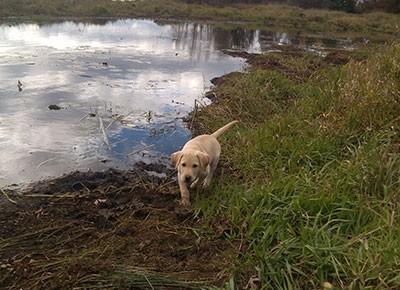
Training a hunting puppy is a uniquely rewarding journey, forging both a lifelong bond and a capable hunting companion. The first year in a hunting dog’s life is pivotal, the time when the foundation for their hunting skills is established. Your commitment during this inaugural year will pave the way for a lasting and fruitful partnership in the world of hunting.
The Joy of Training a Hunting Puppy
Training a gun dog is a rewarding experience that allows you to develop a lifelong bond with a capable and loyal hunting companion. The journey from a playful puppy to a skilled gun dog is filled with challenges and milestones that create a unique and enduring connection. Together, you’ll conquer challenges, celebrate milestones, and forge an enduring connection that will last a lifetime.
The Importance of the First Year in a Hunting Dog’s Development
The first year of a hunting dog’s life is crucial for building a solid foundation in their training and development. It’s during this time that you’ll introduce your puppy to the world of hunting, instill essential obedience, and develop the skills required to become a proficient gun dog.
A recent study focused on how a dog’s early experiences and behavior during its first year can impact its behavior later in life, especially when it comes to working tasks. The study used German Shepherds, and what they found was fascinating. Dogs that were more trainable during their first year tended to do well in a temperament test when they were about 17 months old. On the other hand, dogs that showed fear towards strangers, other dogs, and were less social didn’t perform as well. What’s even more interesting is that dogs that showed behaviors often associated with being a bit restless and hyperactive did better on the test. These findings tell us that the first year of a dog’s life plays a big role in how they behave later on.
When to Start Puppy Training for Hunting
The suitable age to initiate puppy training for hunting typically ranges from 8 to 12 weeks. Training should be age-appropriate, considering your puppy’s limited attention span and physical capabilities. Begin with fundamental obedience and socialization, focusing on building a strong bond. As your puppy matures, introduce more specialized hunting training exercises. Adapt the training to your puppy’s needs, emphasizing patience, consistency, and gradual progress for a successful hunting dog.
Choosing the Right Puppy
Choosing the perfect hunting companion is an important decision that lays the foundation for a rewarding and successful journey in training a gun dog. To make an informed choice, you need to consider several factors that encompass not only the breed but also the puppy’s pedigree, health, temperament, and personality.
Choosing the Right Breed for Your Hunting Needs
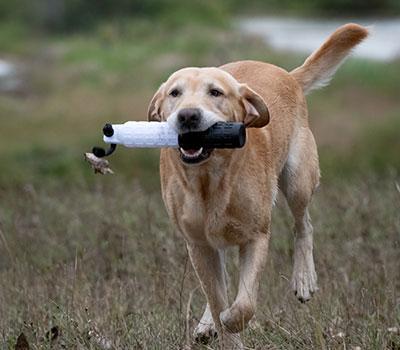
Choosing the right breed is a critical step in your quest to train a proficient gun dog. The hunting world offers a diverse array of dog breeds, each possessing unique characteristics and skills, tailor-made for specific hunting pursuits. Your choice should align with your hunting objectives, whether you’re a waterfowl enthusiast, upland bird hunter, or big game tracker.
If your passion lies in waterfowl hunting, breeds like the Labrador Retriever or Chesapeake Bay Retriever are renowned for their exceptional water-retrieving abilities. These breeds are natural swimmers and excel in retrieving waterfowl from various bodies of water. On the other hand, if your hunting domain involves upland game birds, pointers, and setters like the English Pointer or German Shorthaired Pointer exhibit remarkable skills in locating and pointing game, making them invaluable partners for upland bird hunters.
The breed’s specific characteristics, such as their intelligence, trainability, stamina, and hunting instincts, should align with the demands of your chosen hunting style. When making your breed selection, thorough research, consultation with experienced hunters, and consideration of the terrain and game you intend to pursue will guide you toward the most suitable hunting companion.
Evaluating a Puppy’s Pedigree and Health
Once you’ve identified a breed that fits your hunting needs, the next vital aspect to scrutinize is the puppy’s pedigree and overall health. A strong pedigree is like a roadmap to your puppy’s future performance. It indicates the lineage and hunting history of the puppy’s parents and ancestors. The presence of accomplished hunters in their lineage often foreshadows the potential for success in your hunting dog. Therefore, in-depth research and conversations with breeders are necessary to ensure that your puppy hails from a reputable bloodline.
Moreover, the health of your hunting companion is non-negotiable. Puppies should come with clearances and records of vaccinations, ensuring they are protected from common diseases and illnesses. A healthy puppy not only has a better chance of thriving during training but also stands a lower risk of encountering health-related hurdles during their hunting career.
Regular vet check-ups are essential for your puppy’s ongoing well-being. It’s wise to discuss the veterinarian’s history and recommendations with the breeder to ensure a seamless transition from breeder care to your ongoing veterinary care.
Other Considerations for Picking the Ideal Hunting Companion
Beyond breed and health, there are myriad temperament and personality traits to contemplate when selecting your hunting puppy. These characteristics can significantly influence the success of your training efforts and the compatibility of your hunting partnership.
Temperament
A puppy’s temperament plays a pivotal role in their suitability as a hunting companion. Look for puppies with an even, confident, and eager-to-please temperament. These characteristics make for a puppy that is more likely to adapt well to training and remain composed in challenging hunting situations.
Drive
A strong prey drive is an indispensable quality in a hunting dog. It signifies a puppy’s natural inclination to pursue game, remain persistent in tracking, and display enthusiasm for retrieving. A high prey drive is often a reliable indicator of a puppy’s potential as a hunting partner.
Social Compatibility
Consider how well the puppy interacts with other dogs and people during the initial meeting. A well-socialized puppy is more likely to adapt seamlessly to training and enjoy companionship during hunts. Their ability to interact positively with both fellow dogs and humans is a valuable asset.
Trainability
The willingness of a puppy to learn and obey commands is a significant attribute for a successful hunting partner. While some breeds and individual dogs may be more trainable than others, a puppy displaying a readiness to learn and work with you is a valuable asset.
Energy Level
Different breeds and individual puppies may possess varying energy levels. The puppy’s energy should align with your hunting style. Some breeds are high-energy and thrive with more exercise and stimulation, while others are calmer and may be better suited to a less active hunting approach.
Evaluating these considerations and observing a puppy’s behavior during initial interactions will allow you to make a well-informed decision when choosing the ideal hunting companion. The right blend of genetics, health, temperament, and personality ensures that your puppy is not only suited for the field but also a reliable and devoted partner in your hunting adventures.
Socialization and Early Exposure
The Critical Role of Early Socialization
Early socialization is the cornerstone for building a well-rounded and confident hunting dog. It is during this critical phase that your puppy starts to adapt to the world around them. Socialization involves exposing your puppy to various environments, experiences, and people from a young age. This process is crucial for developing their social skills, ensuring they remain calm and composed in different situations, and reducing the likelihood of fear or anxiety later in life.
For hunting dogs, proper socialization involves gradually introducing your puppy to a wide range of environments, such as open fields, dense woods, and bodies of water. These experiences are essential for preparing them to handle the diverse terrains they will encounter during hunts. The goal is to make these environments feel familiar and safe to your puppy, so they can confidently navigate them when the time comes.
Meeting Other Dogs and People
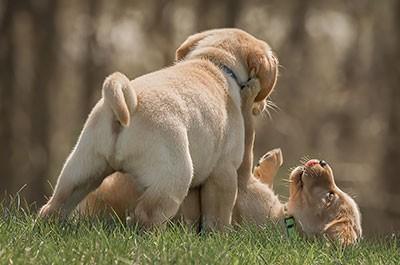
Positive interactions with other dogs and humans are pivotal for ensuring your hunting dog becomes sociable and friendly. It’s not just about getting your puppy accustomed to the presence of others; it’s about fostering positive associations with them. Early exposure to well-behaved dogs and friendly people can help your puppy develop social skills, reducing the likelihood of aggressive or fearful behavior in adulthood.
When introducing your puppy to other dogs, select those with good temperament and behavior. Controlled playdates and supervised interactions in a safe environment can help build social confidence. Encourage your puppy to engage in gentle play and discourage aggressive or dominant behavior. Positive interactions with humans should be similarly encouraged, with treats and praise used to reinforce good behavior.
Nourish Positive Experiences with Wildlife and Water
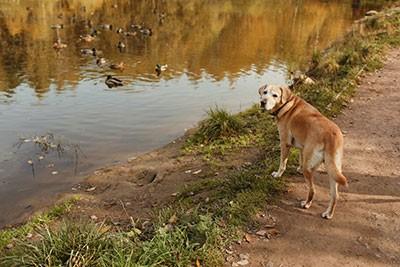
Hunting dogs often work in challenging environments and come into contact with various wildlife. It’s essential to introduce your puppy to these experiences in a way that builds confidence and enthusiasm rather than fear. Begin with controlled encounters, such as observing birds and small animals from a distance. Gradually expose your puppy to the sights, sounds, and smells of wildlife while ensuring their safety.
Moreover, water plays a significant role in many hunting scenarios, so early exposure is crucial. Introduce your puppy to water gently and gradually. Start with shallow and calm bodies of water. Encourage them to wade, swim, and retrieve objects from the water, all while providing positive reinforcement to create a positive association.
Remember that the purpose of early socialization is to prepare your puppy for a lifetime of hunting adventures, ensuring they remain calm, confident, and well-behaved in various hunting environments.
Basic Obedience Training
The Foundation of Obedience for Hunting Dogs
Basic obedience commands are the cornerstone of maintaining control and ensuring the safety of your hunting dog. These fundamental commands lay the groundwork for more advanced training and are essential for maintaining a harmonious partnership in the field. Obedience commands not only help you communicate with your dog but also ensure they respond reliably in hunting situations, where safety and efficiency are paramount.
The key commands to focus on during basic obedience training include “sit,” “stay,” and “recall” (coming when called). These commands are essential for keeping your dog under control, preventing them from engaging with wildlife prematurely, and ensuring they return to you when needed.
The Importance of Consistency and Positive Reinforcement
Basic obedience commands are important, but this is empowered by consistency and positive reinforcement. It is important that are always be consistent with your commands, rewards, and consequences. The keyword here is “always”. Use positive reinforcement, such as treats, praise, and affection, to reward your puppy for following commands correctly. Consistency ensures that your dog understands what is expected of them, while positive reinforcement makes obedience a rewarding and enjoyable experience.
Maintaining consistency is equally vital among all family members who interact with the puppy, as mixed signals can lead to confusion. Make training sessions fun and engaging, keeping them short and frequent to prevent your puppy from becoming bored or distracted.
With patience and consistency, your puppy will learn the fundamental commands, setting the stage for more advanced training and a safe, cooperative hunting partner.
Teaching Basic Commands: Sit, Stay, and Recall
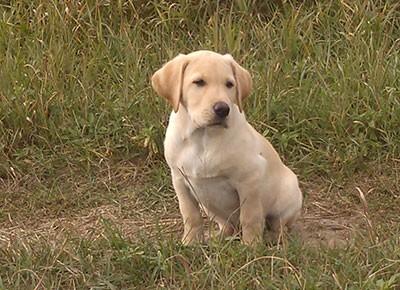
Teaching these basic commands requires patience, consistency, and positive reinforcement. Start with one command at a time, and use clear, concise verbal cues paired with hand signals to communicate your expectations to your puppy. For example, when teaching “sit,” say the word while gently pressing on your puppy’s hindquarters to encourage them to sit. When they do so, reward them with a treat and praise.
“Stay” and “recall” are equally important. “Stay” will help keep your dog in place, especially when you need them to remain still while you prepare for a shot or set up decoys.
“Recall” ensures that your dog returns to you promptly, even amid exciting hunting scenarios. Consistent practice in various environments is crucial to reinforce these commands under different conditions.
Gun and Noise Sensitivity
Exposure to gunshots and other loud noises is an essential component of training a hunting dog. Since many hunting scenarios involve the use of firearms, ensuring that your puppy is not only accustomed to these sounds but also maintains a positive association with them is crucial for their success in the field. In this section, we’ll explore the gradual exposure to gunshots, the techniques to build a positive association with gun sounds, and the use of desensitization and counter-conditioning to develop your puppy’s confidence in noisy hunting situations.
Gradual Exposure to Gunshots and Loud Noises
Introducing your puppy to gunshots and loud noises should be a gradual and carefully orchestrated process. Start with milder noises and gradually work your way up to the sound of actual gunshots. This approach prevents overwhelming your puppy and minimizes the risk of developing noise aversion or anxiety.
Begin by exposing your puppy to everyday sounds, such as kitchen appliances, doorbells, or sirens. As your puppy becomes accustomed to these noises, you can move on to more intense but controlled sounds, like clapping or stomping. This gradual progression prepares your puppy for the more pronounced and unpredictable sounds they will encounter during hunting.
During this phase, maintain a calm and reassuring presence to convey to your puppy that these noises are not associated with danger. Treats, praise, and play can be used to create positive associations with exposure to these sounds, making it a pleasant experience for your puppy.
Building a Positive Association with Gun Sounds
Creating a positive association with gun sounds is a necessity for your puppy’s comfort and confidence in hunting situations. Start by associating the sound of gunshots with something enjoyable and rewarding. To build this association effectively, you can use classical conditioning. When your puppy hears a gunshot, offer them a high-value treat immediately. This will lead your puppy to associate the sound of gunfire with positive outcomes, reinforcing their confidence and comfort in these situations.
Gradually increase the intensity of the gun sounds as your puppy becomes more at ease. If you have access to a starter pistol or blanks, use them to mimic gunfire sounds in a controlled environment. Keep the experience positive, ensuring that your puppy always associates the noise with rewards.
Using Desensitization and Counter-Conditioning Techniques
Desensitization and counter-conditioning are valuable techniques for helping your puppy become comfortable with the sounds of hunting. Desensitization involves exposing your puppy to the noise at a low level and progressively increasing the intensity or duration over time, all while ensuring a positive experience. Counter-conditioning pairs the noise with something pleasurable, changing your puppy’s emotional response from fear to anticipation. Always gauge your puppy’s comfort level and never push them beyond their tolerance.
Introduction to Retrieving
The Role of Retrieving in Hunting
Retrieving is the process of facilitating the recovery of game and ensuring a successful hunt. This is a basic all gun dogs should learn. The goal of letting the gun dog retrieve game is to minimize the risk of losing wounded animals. Without the help of a hunting dog’s superb sense of smell and agility, retrieving game be tiresome. Also, considering many birds make use of camouflage, trying to find them after they are shot down can be quite difficult.
The early stages of retrieving training are pivotal for paving the way to future success. Focusing on the basics, such as mastering the “fetch” command (use of the pup’s name here is a good choice) and ensuring consistent obedience, is essential.
Fun and Engaging Retrieving Games
Retrieving games, when approached with creativity and enthusiasm, transform into enjoyable learning experiences for your puppy, laying the foundation for strong retrieving skills. Let’s explore a variety of exciting games and exercises tailored to nurture your puppy’s abilities, both physically and mentally, essential for successful hunting endeavors.
- Fetch with Retrieving Toys: Introduce your puppy to classic games of fetch using specialized retrieving toys like the Waterfowl Retriever Training Dummy or Deluxe Hunting Dog Training Bumpers. These specially designed tools float on water, making them perfect for water retrieves. Begin in a controlled environment, gradually increasing the distance and complexity to challenge your puppy’s skills.
- Water Retrieves: If you have access to a safe water body, incorporate water retrieves into your training routine. Encourage your puppy to retrieve toys from the water, enhancing their swimming abilities and confidence in aquatic environments. Start with shallow water and progress to deeper areas as your puppy gains proficiency.
- Mock Hunting Scenarios: Create simulated hunting scenarios in your training area using decoys and scents to mimic real hunting situations. Guide your puppy to find hidden objects or dummies, honing their scent detection skills and teaching them to work effectively in different terrains.
- Retrieve and Recall Races: Combine retrieving with recall commands. Have someone hold your puppy while you move away, then call your puppy back and encourage them to fetch a training bumper. This game enhances both retrieving skills and responsiveness to your commands.
- Hide and Seek Retrieval: Hide retrieving toys or dummies in your training area and encourage your puppy to find and retrieve them. This game sharpens your puppy’s scent tracking abilities while making the training process enjoyable.
- Obstacle Course Retrieving: Create a small obstacle course with hurdles and tunnels. Guide your puppy through the course, incorporating retrieving tasks at various stages. This game not only improves physical agility but also enhances problem-solving skills.
By incorporating these engaging retrieving games and exercises, you not only strengthen your puppy’s retrieving abilities but also instill a love for hunting tasks. Remember, each game should be positive and rewarding, making the learning process both effective and enjoyable for your budding hunting companion.
Ongoing Health and Wellness
Regular Vet Check-ups and Vaccinations
Regular vet check-ups are fundamental. They allow for early issue detection and preventative care. Typically, adult dogs should have annual check-ups, while puppies require more frequent visits to ensure their development is on track. Customized vaccination schedules, tailored to your dog’s age, breed, lifestyle, and regional considerations, are also crucial. Core vaccines like those for rabies and distemper should be administered regularly, and non-core vaccines may be recommended based on hunting activities and exposure risks. In addition to vaccinations, monitoring and treating parasites, dental care, and proper nutrition are integral components of your dog’s health maintenance.
Maintaining a strong partnership with your veterinarian ensures your hunting dog remains in peak condition for the field, promoting longevity and peak performance during hunting activities.
Nutrition Tailored to a Hunting Dog’s Needs
Proper nutrition is just as important. As active and energetic companions, hunting dogs have unique dietary requirements that differ from those of sedentary pets. Their diet should be specially tailored to provide the right balance of proteins, fats, and carbohydrates, ensuring they have the energy and endurance needed for strenuous hunting tasks. High-quality dog food rich in lean proteins supports muscle strength, while a moderate amount of healthy fats provides sustained energy throughout long hunts. Additionally, carbohydrates supply quick bursts of energy for intense moments in the field. It’s crucial to consult with your veterinarian or a canine nutritionist to determine the optimal diet for your specific hunting dog, taking into account their breed, age, activity level, and any health considerations. By providing the right nutrition, you’ll be supporting your hunting dog’s overall health, vitality, and success in the field.
Training a Hunting Puppy: Nurturing a Lifelong Hunting Companion
The first year in a hunting dog’s life is very important. It is a time when the foundations of obedience, socialization, and specialized skills are laid. This journey is not just about honing a skilled hunting companion; it’s a testament to our commitment to nurturing and caring for our four-legged friends. All the effort invested during this inaugural year set the stage for a lifetime of exhilarating hunting adventures and the creation of an unbreakable connection between hunter and hunting dog.
Choosing the right breed, nurturing positive behaviors, and fostering a love for retrieving are all integral elements in crafting a proficient hunting dog. The commitment to early socialization and strategic exposure to gun sounds are crucial for building a confident and reliable hunting partner. Moreover, ongoing attention to your dog’s health and nutritional needs ensures their well-being and longevity. The journey of training a hunting puppy is a labor of love, an intricate dance of patience and perseverance, with the promise of a lifelong partnership forged in the great outdoors. As you embark on this journey, remember that your hunting dog is not just a companion; they are a testament to the age-old alliance between humanity and the natural world, a bond that transcends time and defines the spirit of the hunt.
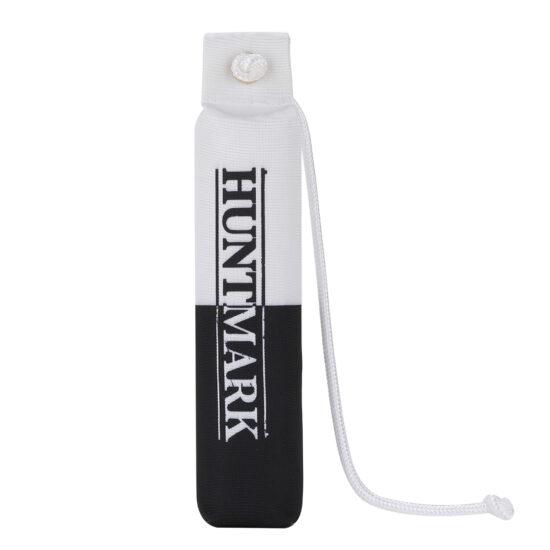
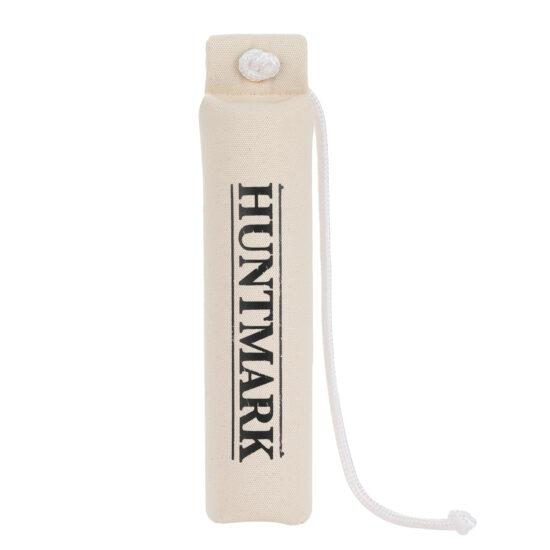
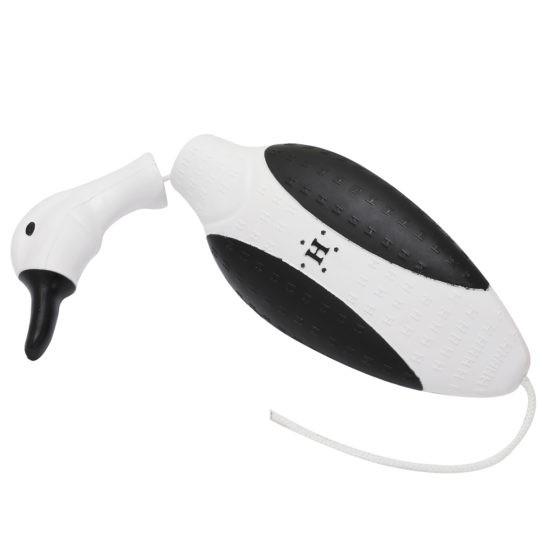




Leave a Reply